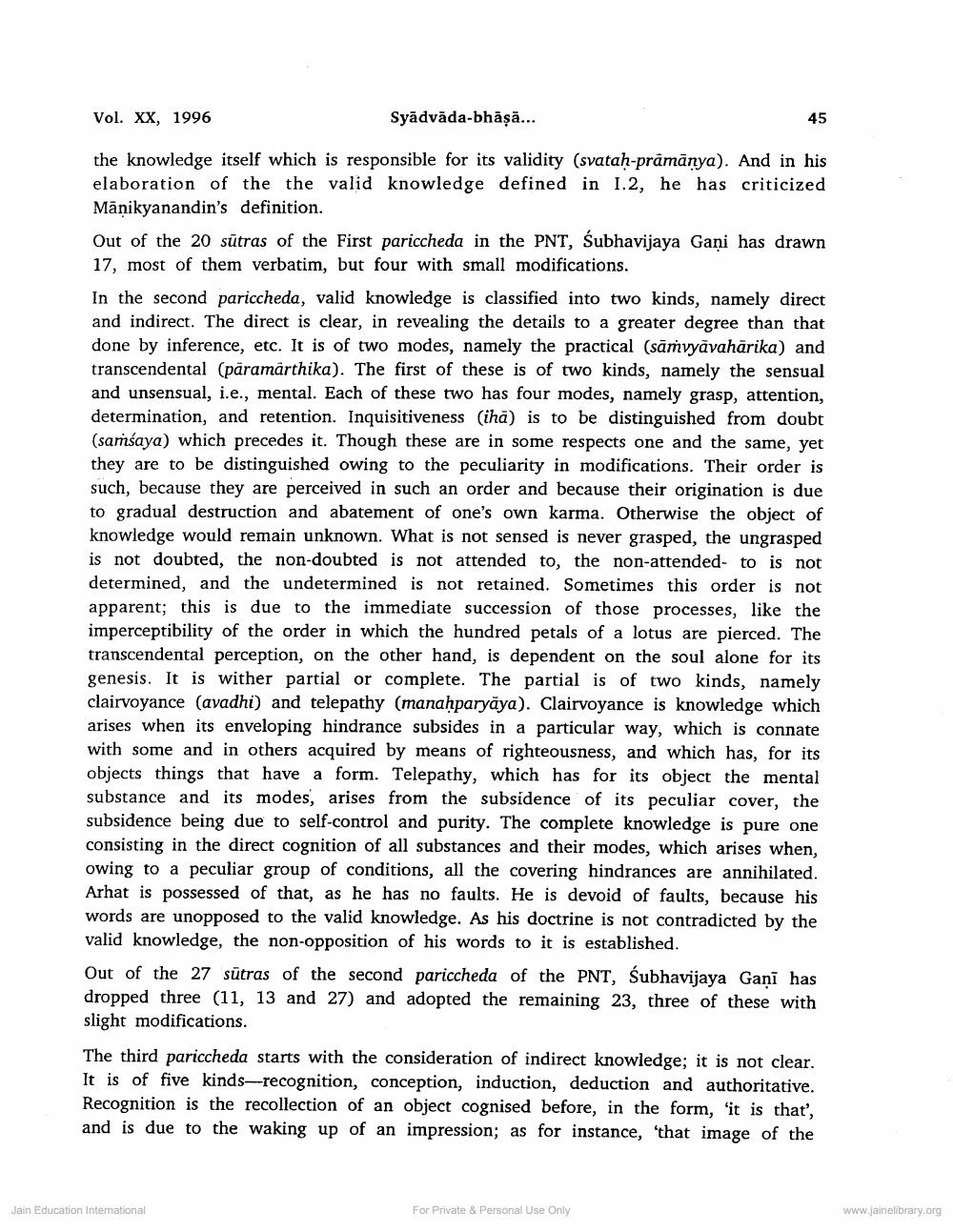________________
Vol. XX, 1996
Syādvāda-bhāṣā...
45
the knowledge itself which is responsible for its validity (svatah-prämānya). And in his elaboration of the the valid knowledge defined in 1.2, he has criticized Mäņikyanandin's definition. Out of the 20 sūtras of the First pariccheda in the PNT, śubhavijaya Gani has drawn 17, most of them verbatim, but four with small modifications. In the second pariccheda, valid knowledge is classified into two kinds, namely direct and indirect. The direct is clear, in revealing the details to a greater degree than that done by inference, etc. It is of two modes, namely the practical (sāṁvyāvahārika) and transcendental (paramarthika). The first of these is of two kinds, namely the sensual and unsensual, i.e., mental. Each of these two has four modes, namely grasp, attention, determination, and retention. Inquisitiveness (iha) is to be distinguished from doubt (samsaya) which precedes it. Though these are in some respects one and the same, yet they are to be distinguished owing to the peculiarity in modifications. Their order is such, because they are perceived in such an order and because their origination is due to gradual destruction and abatement of one's own karma. Otherwise the object of knowledge would remain unknown. What is not sensed is never grasped, the ungrasped is not doubted, the non-doubted is not attended to, the non-attended to is not determined, and the undetermined is not retained. Sometimes this order is not apparent; this is due to the immediate succession of those processes, like the imperceptibility of the order in which the hundred petals of a lotus are pierced. The transcendental perception, on the other hand, is dependent on the soul alone for its genesis. It is wither partial or complete. The partial is of two kinds, namely clairvoyance (avadhi) and telepathy (manahparyāya). Clairvoyance is knowledge which arises when its enveloping hindrance subsides in a particular way, which is connate with some and in others acquired by means of righteousness, and which has, for its objects things that have a form. Telepathy, which has for its object the mental substance and its modes, arises from the subsidence of its peculiar cover, the subsidence being due to self-control and purity. The complete knowledge is pure one consisting in the direct cognition of all substances and their modes, which arises when, owing to a peculiar group of conditions, all the covering hindrances are annihilated. Arhat is possessed of that, as he has no faults. He is devoid of faults, because his words are unopposed to the valid knowledge. As his doctrine is not contradicted by the valid knowledge, the non-opposition of his words to it is established. Out of the 27 sūtras of the second pariccheda of the PNT, śubhavijaya Gani has dropped three (11, 13 and 27) and adopted the remaining 23, three of these with slight modifications.
The third pariccheda starts with the consideration of indirect knowledge; it is not clear. It is of five kinds--recognition, conception, induction, deduction and authoritative. Recognition is the recollection of an object cognised before, in the form, 'it is that, and is due to the waking up of an impression; as for instance, that image of the
Jain Education International
For Private & Personal Use Only
www.jainelibrary.org




